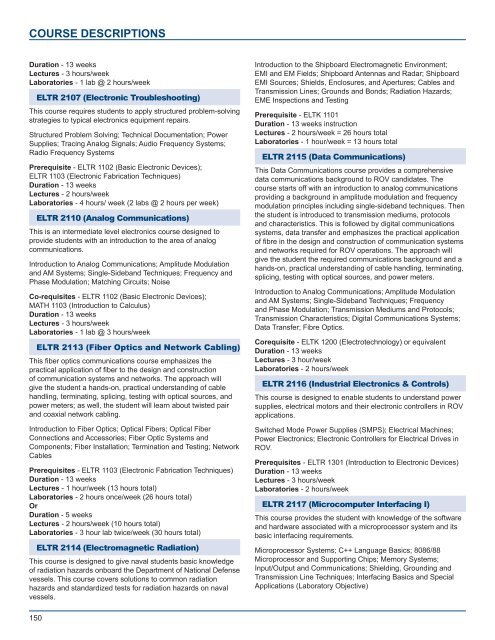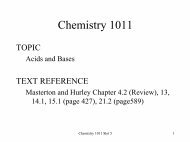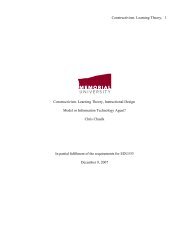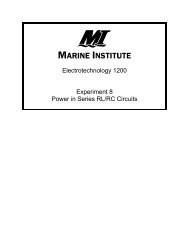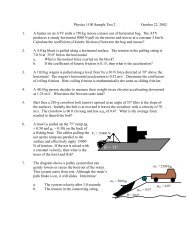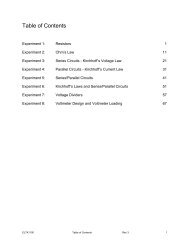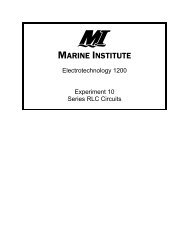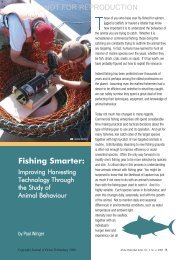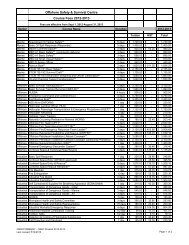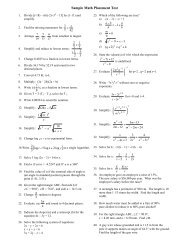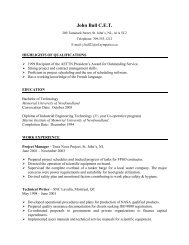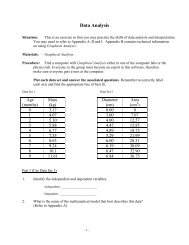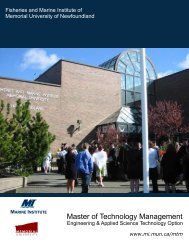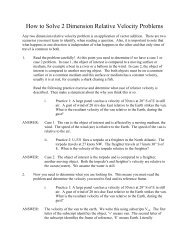Academic Calendar - Fisheries and Marine Institute - Memorial ...
Academic Calendar - Fisheries and Marine Institute - Memorial ...
Academic Calendar - Fisheries and Marine Institute - Memorial ...
You also want an ePaper? Increase the reach of your titles
YUMPU automatically turns print PDFs into web optimized ePapers that Google loves.
COURSE DESCRIPTIONS<br />
Duration - 13 weeks<br />
Lectures - 3 hours/week<br />
Laboratories - 1 lab @ 2 hours/week<br />
ELTR 2107 (Electronic Troubleshooting)<br />
This course requires students to apply structured problem-solving<br />
strategies to typical electronics equipment repairs.<br />
Structured Problem Solving; Technical Documentation; Power<br />
Supplies; Tracing Analog Signals; Audio Frequency Systems;<br />
Radio Frequency Systems<br />
Prerequisite - ELTR 1102 (Basic Electronic Devices);<br />
ELTR 1103 (Electronic Fabrication Techniques)<br />
Duration - 13 weeks<br />
Lectures - 2 hours/week<br />
Laboratories - 4 hours/ week (2 labs @ 2 hours per week)<br />
ELTR 2110 (Analog Communications)<br />
This is an intermediate level electronics course designed to<br />
provide students with an introduction to the area of analog<br />
communications.<br />
Introduction to Analog Communications; Amplitude Modulation<br />
<strong>and</strong> AM Systems; Single-Sideb<strong>and</strong> Techniques; Frequency <strong>and</strong><br />
Phase Modulation; Matching Circuits; Noise<br />
Co-requisites - ELTR 1102 (Basic Electronic Devices);<br />
MATH 1103 (Introduction to Calculus)<br />
Duration - 13 weeks<br />
Lectures - 3 hours/week<br />
Laboratories - 1 lab @ 3 hours/week<br />
ELTR 2113 (Fiber Optics <strong>and</strong> Network Cabling)<br />
This fiber optics communications course emphasizes the<br />
practical application of fiber to the design <strong>and</strong> construction<br />
of communication systems <strong>and</strong> networks. The approach will<br />
give the student a h<strong>and</strong>s-on, practical underst<strong>and</strong>ing of cable<br />
h<strong>and</strong>ling, terminating, splicing, testing with optical sources, <strong>and</strong><br />
power meters; as well, the student will learn about twisted pair<br />
<strong>and</strong> coaxial network cabling.<br />
Introduction to Fiber Optics; Optical Fibers; Optical Fiber<br />
Connections <strong>and</strong> Accessories; Fiber Optic Systems <strong>and</strong><br />
Components; Fiber Installation; Termination <strong>and</strong> Testing; Network<br />
Cables<br />
Prerequisites - ELTR 1103 (Electronic Fabrication Techniques)<br />
Duration - 13 weeks<br />
Lectures - 1 hour/week (13 hours total)<br />
Laboratories - 2 hours once/week (26 hours total)<br />
Or<br />
Duration - 5 weeks<br />
Lectures - 2 hours/week (10 hours total)<br />
Laboratories - 3 hour lab twice/week (30 hours total)<br />
ELTR 2114 (Electromagnetic Radiation)<br />
This course is designed to give naval students basic knowledge<br />
of radiation hazards onboard the Department of National Defense<br />
vessels. This course covers solutions to common radiation<br />
hazards <strong>and</strong> st<strong>and</strong>ardized tests for radiation hazards on naval<br />
vessels.<br />
Introduction to the Shipboard Electromagnetic Environment;<br />
EMI <strong>and</strong> EM Fields; Shipboard Antennas <strong>and</strong> Radar; Shipboard<br />
EMI Sources; Shields, Enclosures, <strong>and</strong> Apertures; Cables <strong>and</strong><br />
Transmission Lines; Grounds <strong>and</strong> Bonds; Radiation Hazards;<br />
EME Inspections <strong>and</strong> Testing<br />
Prerequisite - ELTK 1101<br />
Duration - 13 weeks instruction<br />
Lectures - 2 hours/week = 26 hours total<br />
Laboratories - 1 hour/week = 13 hours total<br />
ELTR 2115 (Data Communications)<br />
This Data Communications course provides a comprehensive<br />
data communications background to ROV c<strong>and</strong>idates. The<br />
course starts off with an introduction to analog communications<br />
providing a background in amplitude modulation <strong>and</strong> frequency<br />
modulation principles including single-sideb<strong>and</strong> techniques. Then<br />
the student is introduced to transmission mediums, protocols<br />
<strong>and</strong> characteristics. This is followed by digital communications<br />
systems, data transfer <strong>and</strong> emphasizes the practical application<br />
of fibre in the design <strong>and</strong> construction of communication systems<br />
<strong>and</strong> networks required for ROV operations. The approach will<br />
give the student the required communications background <strong>and</strong> a<br />
h<strong>and</strong>s-on, practical underst<strong>and</strong>ing of cable h<strong>and</strong>ling, terminating,<br />
splicing, testing with optical sources, <strong>and</strong> power meters.<br />
Introduction to Analog Communications; Amplitude Modulation<br />
<strong>and</strong> AM Systems; Single-Sideb<strong>and</strong> Techniques; Frequency<br />
<strong>and</strong> Phase Modulation; Transmission Mediums <strong>and</strong> Protocols;<br />
Transmission Characteristics; Digital Communications Systems;<br />
Data Transfer; Fibre Optics.<br />
Corequisite - ELTK 1200 (Electrotechnology) or equivalent<br />
Duration - 13 weeks<br />
Lectures - 3 hour/week<br />
Laboratories - 2 hours/week<br />
ELTR 2116 (Industrial Electronics & Controls)<br />
This course is designed to enable students to underst<strong>and</strong> power<br />
supplies, electrical motors <strong>and</strong> their electronic controllers in ROV<br />
applications.<br />
Switched Mode Power Supplies (SMPS); Electrical Machines;<br />
Power Electronics; Electronic Controllers for Electrical Drives in<br />
ROV.<br />
Prerequisites - ELTR 1301 (Introduction to Electronic Devices)<br />
Duration - 13 weeks<br />
Lectures - 3 hours/week<br />
Laboratories - 2 hours/week<br />
ELTR 2117 (Microcomputer Interfacing I)<br />
This course provides the student with knowledge of the software<br />
<strong>and</strong> hardware associated with a microprocessor system <strong>and</strong> its<br />
basic interfacing requirements.<br />
Microprocessor Systems; C++ Language Basics; 8086/88<br />
Microprocessor <strong>and</strong> Supporting Chips; Memory Systems;<br />
Input/Output <strong>and</strong> Communications; Shielding, Grounding <strong>and</strong><br />
Transmission Line Techniques; Interfacing Basics <strong>and</strong> Special<br />
Applications (Laboratory Objective)<br />
150


